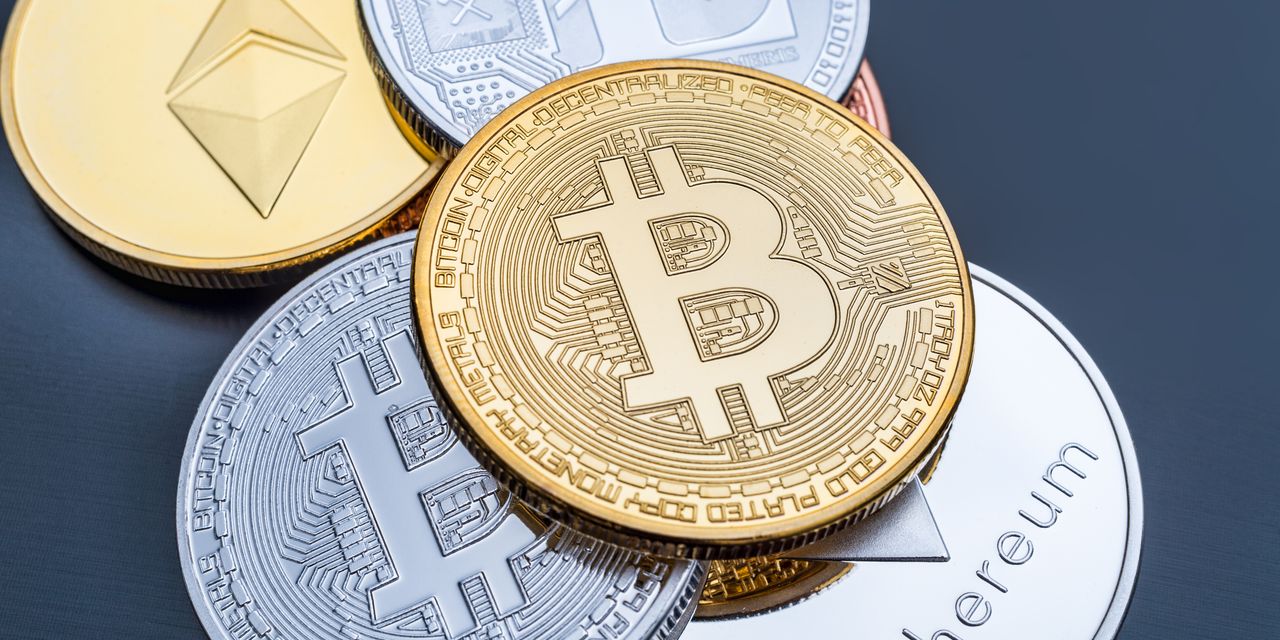Doomsayers have called the death of cryptocurrency many times since Bitcoin launched 14 years ago. This week provided another opportunity after the Securities and Exchange Commission accused two leading exchanges of violating a slew of U.S. laws.
The crackdown against Binance and
Coinbase Global
(ticker: COIN) darkens long-term prospects for crypto exchanges. More broadly, the cases raise critical questions about whether tokens aside from
Bitcoin
should be regulated as securities, and whether any crypto platforms should be allowed to operate in the U.S. without radical overhauls. If the SEC ultimately prevails in court—which could take years—the industry would face much stricter oversight, forced to play by the same rules as the New York Stock Exchange, brokerages like
Morgan Stanley
(MS), and the thousands of companies that trade publicly.
The crypto industry, with its libertarian ethos, has long claimed it should be treated differently; Coinbase has even sued the SEC to try to push it to establish crypto-specific rules. The SEC may now press courts to decide the issue with its cases against Coinbase and Binance, though other cases, including one involving the company Ripple, could provide some clarity in the near-term.
For now, the market seems to be betting that crypto will adapt and move forth. The price of Bitcoin has stabilized, along with other tokens and crypto stocks. The SEC’s moves weren’t a surprise—partly because the agency had warned Coinbase back in March that it would be sued. After a year-long bear market, selling pressure appears to have dissipated. “There just aren’t that many sellers left, especially after the wipeouts that occurred in 2022,” says Bob Ras, co-founder of trading platform Sologenic.
Other signs of crypto resilience include relatively small withdrawals from Binance, the world’s largest crypto exchange with more than $59 billion of tokens on its platform. Traders appeared to yank more than $1 billion from Binance in recent days, far less than the exchange lost after the FTX crisis last November.
Binance, in a blog post, said “we intend to defend our platform vigorously.” It said it had “actively cooperated with the SEC’s investigations and have worked hard to answer their questions and address their concerns.”
Coinbase has fans on Wall Street. While traders are betting heavily against it, with 22% of its shares outstanding sold short, it has stabilized in the low $50s. Cathie Wood’s ARK Investment Management, among Coinbase’s biggest investors, bought the dip.
“For investors who can stomach the uncertainty in Coinbase’s business, we view the pullback…as an attractive entry point,” said MoffettNathanson analyst Lisa Ellis in a note. In a worst-case scenario, Coinbase would have to delist most non-Bitcoin and Ether tokens and end its fast-growing “staking” service, costing the brokerage 25% to 30% of revenue, she estimates. But the exchange would survive, focused on allowable tokens and other services, and expanding offshore.
Still, it’s hard to sugarcoat the industry’s mounting legal problems. In both the Binance and Coinbase complaints, the SEC is essentially arguing that the companies’ core businesses and structures are illegal under U.S. securities laws.
In Coinbase’s case, the violations, according to the SEC, include failures to separate the exchange from brokerage and clearing activities—all standard practices under securities laws to help protect investors. The SEC also claims that Coinbase facilitates trading in legions of smaller tokens or “altcoins,” many of which the agency views as unregistered securities. And the SEC says Coinbase’s staking business, which offers high yields on tokens, is illegal and should be regulated like any other registered investment contract or service.
Coinbase has “a demonstrated commitment to compliance,” said Paul Grewal, general counsel of Coinbase, in a statement. The company will “continue to operate our business as usual,” he added.
Mizuho analyst Dan Dolev, a longtime bear on Coinbase, doesn’t buy that. “They’re saying that to pretend that everything’s OK,” he says, adding that “cash flow constraints” come with trying to maintain position in a competitive market while fighting an existential lawsuit from the SEC.
Dolev also sees this as a crushing blow to digital assets at large. “The whole gospel of institutional adoption is getting thrown out the window because no CFO or CEO of a major bank is going to get their hands dirty with something that they know is under the gun.”
The SEC isn’t the only one cracking down. Binance is facing a lawsuit from the Commodity Futures Trading Commission. Financial regulators in California have told Coinbase to stop offering securities in the state and nine other state authorities issued similar orders this week.
“The SEC lawsuits could pose a major threat to trading,” says Clara Medalie, head of research at crypto data provider Kaiko, noting that Binance entities and Coinbase have a combined trading market share of 60%.
The remarkable thing about crypto, however, is that it’s never hard to find hope. Stéphane Ouellette, CEO of crypto advisor and capital markets platform
FRNT Financial,
points out the SEC’s charges against Binance and Coinbase came as another U.S. regulator delivered a victory to the industry. The CFTC on Monday gave the green light for the crypto arm of the
Chicago Board Options Exchange,
or Cboe, to offer futures for Bitcoin and Ether to traders with leverage, or borrowed money.
“This is the playbook: they wipe out certain companies and then rebuild with businesses that they feel more comfortable with and trust,” says Ouellette. “The industry has reinvented itself in almost every one of these bear market cycles,” he adds.
The winner in all this may be Bitcoin and perhaps Ether, the second-largest token. Ultimately, these are the digital assets that institutional investors primarily want to trade, much more than the smaller tokens, many of which the SEC calls unregistered securities.
“In the long run, this doesn’t really matter one way or another for Bitcoin,” says Cory Klippsten, CEO of Swan Bitcoin, a crypto firm focused solely on the largest token. “There was always going to be a scam phase.”
Bitcoin has so far dodged the token/security debate. SEC Chair Gary Gensler has indicated support for regulating Bitcoin as a commodity, not a security. Ether also has some regulators, notably the CFTC, saying it’s a commodity. Combined, the tokens account for more than $700 billion of crypto market value, out of $1.1 trillion in total. Both are likely to continue being traded globally while the debate goes on about which other tokens qualify as securities.
Clarity on the question may arrive soon in a case involving Ripple, the issuer of the XRP token that the SEC sued in 2020 for selling unregistered securities. A ruling in that case is likely due in the coming weeks or months.
There are ways for crypto to coexist peacefully with regulators. The SEC and Coinbase could settle out of court, though that seems a remote possibility near term. Congress could intervene with legislation; several bills are floating around, including one that was recently introduced in the House of Representatives on digital asset market structure.
“We believe that this legislation will likely provide a path for the SEC and Coinbase to settle the lawsuit,” Ellis said, describing how Coinbase could agree to delist tokens that meet the standard of securities defined in the legislation.
If the U.S. ultimately proves too hostile, the industry could move offshore, with some precedents for success. The stablecoin issuer Tether, based offshore, has built a highly profitable enterprise with an $83 billion market cap for its tokens, without issuing standard U.S. audits of its finances or business practices.
While the U.S. regulates crypto through enforcement, other jurisdictions are plowing ahead with rules. The European Union was early in adopting rules covering exchanges, digital wallets, and stablecoins, though it hasn’t ruled on the token/security issue. Business hubs like Dubai, Singapore, and Hong Kong are now home to flourishing crypto ecosystems, thanks to friendlier policies.
“The space got here without the U.S., it’ll continue to grow without the U.S.,” says Ouellette. “Are people in Indonesia not going to buy the next hot altcoin because the SEC says they can’t? No.”
But running away from the U.S. poses both practical and economic problems. On the practical side, companies that run afoul of U.S. rules could be shut out of the banking system, pushing crypto even further from mainstream investment. Avoiding the largest capital market in the world doesn’t help crypto’s long-term aspirations to be a mainstream asset class.
“The charges against Binance and Coinbase do not make crypto uninvestible,” says Kate Laurence, co-founder and general partner at Bloccelerate, a Web3-focused venture fund. But some crypto companies “have already adjusted their strategies and moved their operations overseas,” she adds, and the more that happens, the harder it may be for crypto to attract institutional capital.
The SEC wants to send a message to crypto that there’s no place to hide. It will take more time to find out if the agency will ultimately pursue crypto into extinction.
Write to Jack Denton at [email protected]
Read the full article here












